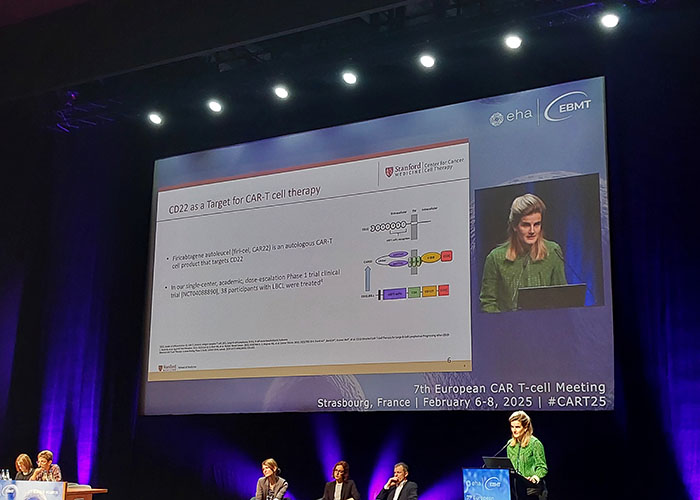Chimeric Antigen Receptor T-cell therapy—better known as CAR-T therapy—has revolutionized treatment for certain blood cancers, especially B-cell malignancies like acute lymphoblastic leukemia (ALL) and non-Hodgkin lymphoma (NHL).
While many CAR-T therapies focus on a protein called CD19, researchers and clinicians are increasingly turning their attention to another important target: CD22.
What Is CD22?
CD22 is a protein found on the surface of most B cells, including cancerous B cells. It plays a role in how B cells communicate and survive, making it a promising target for therapy. Unlike CD19, CD22 is also involved in regulating immune responses, which might give it some unique advantages as a treatment target.

Photo: CART25: European hematology conference in Strasbourg, France, 2025
Why Target CD22?
Although CD19-targeted CAR-T therapies have been life-changing for many patients, some cancers find ways to escape these therapies. In fact, up to 50% of relapses after CD19 CAR-T therapy are due to the cancer cells losing CD19 expression—a phenomenon known as antigen escape.
This is where CD22 comes in. CD22 is often still present on the cancer cells even after CD19 has disappeared. That makes CD22-targeted CAR-T therapy an excellent option for patients who relapse after CD19 treatment.
What Do the Studies Show?
Clinical trials have shown encouraging results using CD22 CAR-T therapy in children and adults with relapsed or refractory B-cell ALL, especially those who no longer respond to CD19-targeted therapies. In one major study from the National Cancer Institute (NCI):
- Over 70% of patients achieved complete remission after receiving CD22 CAR-T therapy.
- Some patients had long-term responses, although relapses still occurred, often due to reduced levels of CD22 on the cancer cells.
Because of this, researchers are now testing dual-target CAR-T therapies that go after both CD19 and CD22 at the same time to lower the risk of relapse even further.
Challenges to Consider
CD22 CAR-T therapy isn’t without its challenges:
- Relapse still happens, sometimes due to cancer cells lowering CD22 expression.
- As with all CAR-T therapies, side effects like cytokine release syndrome (CRS) and neurological symptoms can occur and must be managed carefully.
- It’s still mostly available through clinical trials or at specialized centers.
What’s Next?
Researchers are working on:
- Dual CAR-Ts targeting CD19 and CD22 simultaneously vNext-gen CD22 CARs that bind more tightly to cancer cells
- Combining CD22 CAR-T with other therapies to boost effectiveness
This is an exciting area of innovation that may open new doors for patients who currently have limited options.
Key Takeaways
- CD22 is a promising CAR-T therapy target for B-cell cancers like ALL and NHL.
- It’s especially useful after relapse from CD19 CAR-T due to antigen escape.
- Early trials show strong remission rates, but further research is ongoing.
- Dual-target CAR-T therapies (CD19 + CD22) may offer more durable responses.
Publication date: March 2025
Sources
1. Fry, T.J., et al. (2018). CD22-targeted CAR T cells induce remission in B-ALL that is naive or resistant to CD19-targeted CAR immunotherapy. Nature Medicine, 24, 20–28.
2. National Cancer Institute – CAR-T Clinical Trials
3. frontiersin.org
4. pubmed
5. cancer.gov










